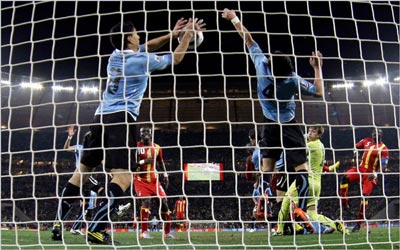Rules vs. Norms in Development, or more importantly, Did Uruguay cheat Ghana?
 Today there is a great discussion of rules vs. norms because it applies to something people REALLY care about: World Cup football. Uruguayan player Luis Suarez illegally blocked a sure Ghana goal with his hands, a goal in the last seconds that would have won Ghana the game. He was ejected according to the rules and Ghana awarded a penalty kick, which they missed, and then Uruguay subsequently won.
Did Suarez cheat? An article on GhanaWeb says yes. Others say no. A major neutral, the Wall Street Journal (which now has a surprisingly good sports section) backs Ghanaweb: Uruguay cheated "big-time." One side would say Suarez realized his team would surely lose if he let the ball go past his hands and lawfully and rationally chose to take the penalty to give his team a chance; the other side says intentionally breaking the rule to prevent a loss was unforgivably unsportsmanlike.
Today there is a great discussion of rules vs. norms because it applies to something people REALLY care about: World Cup football. Uruguayan player Luis Suarez illegally blocked a sure Ghana goal with his hands, a goal in the last seconds that would have won Ghana the game. He was ejected according to the rules and Ghana awarded a penalty kick, which they missed, and then Uruguay subsequently won.
Did Suarez cheat? An article on GhanaWeb says yes. Others say no. A major neutral, the Wall Street Journal (which now has a surprisingly good sports section) backs Ghanaweb: Uruguay cheated "big-time." One side would say Suarez realized his team would surely lose if he let the ball go past his hands and lawfully and rationally chose to take the penalty to give his team a chance; the other side says intentionally breaking the rule to prevent a loss was unforgivably unsportsmanlike.
One possible fix is to perfect the rules. If it pays to break the rules, they must be bad rules. The rule could be changed to give an automatic goal in this situation. However, it's not that easy -- it's impossible to have perfect rules. (The "automatic goal" rule would have worked here, but general application would inevitably lead to new disputes about whether the ball would really have gone in.)
The other solution to imperfect rules is to supplement them with norms. With strong norms in business, a businessman who exploits a loophole to cheat another businessman will often find himself ostracized and will lose a lot of future business, so he doesn't cheat. Norms can handle complex situations more flexibly than explicit rules, so they are an essential complement to rules.
Unfortunately for Ghana and for a lot of cheating victims in business, norms have to reflect a wide and deep consensus of what is right and a willingness to punish the cheater. If everyone agreed now that Suarez had cheated and will ever after see him as the equivalent of a thieving child-beater, then maybe he would not have used his hands in the first place. Unfortunately, as often happens in developing countries, neither the rules nor the norms were strong enough to prevent cheating and we are the worse for it.
 From Aid to Equality
From Aid to Equality
